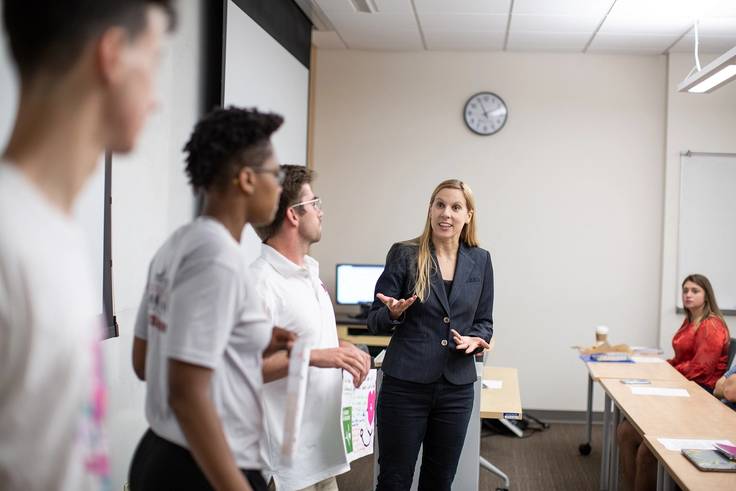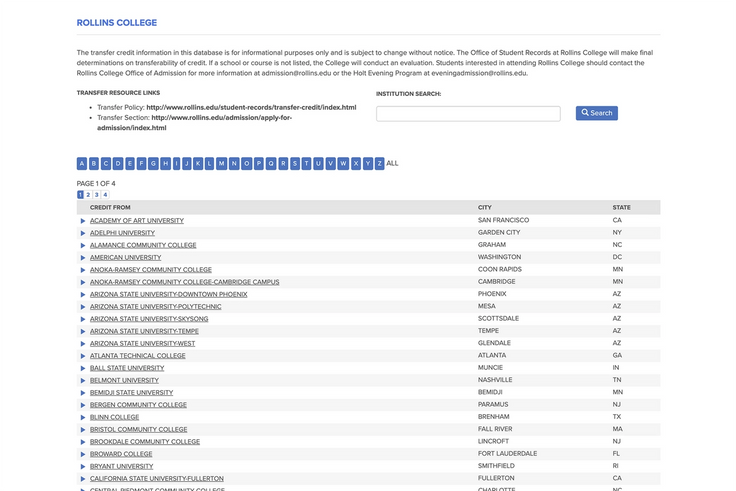Transfer Credit
You’ve worked hard to earn your credits, and we want to put them to use toward your degree. Understanding how your credits will transfer is likely a major part of your decision to attend a new school, so let us help you determine how your courses apply here at Rollins.
Determining If Your Credit Will Transfer
Rollins will accept most transfer credit for courses completed at a regionally accredited college or university. When reviewing courses for transfer, the following must be met:
- Courses must be college level. Developmental courses will not qualify for transfer.
- Only courses with a C- grade or higher are transferable.
- Students can transfer a maximum of 70 credit hours.

Connect With Your Admission Counselor
Jonathan Hooker, associate director of transfer admission, will guide you through every aspect of the admission process.

Understanding the Rollins Approach
At Rollins, we want all of our students to have a multi-disciplinary approach to their education. This is reflected in how students complete courses within their major. Our curriculum is divided into three parts—general education requirements, major requirements, and general elective requirements. As a transfer student, it is important that you understand how your credit is applied to each of these three parts.
Completing the Rollins General Education Requirements
Transfer students who enter Rollins with a completed Associate of Arts (AA) degree from a regionally accredited institution are waived of the Rollins general education requirements and will matriculate with junior standing.
Students entering Rollins without a completed AA degree can complete the Rollins general education requirements by transferring in courses that meet each of the following criteria.
- Math Competency Courses in statistics and most math courses beyond intermediate algebra.
- Ethics Competency Courses that include “ethics” in the title, course description or syllabus.
- Writing Competency Courses focused on writing and composition skills or a score of 4 or 5 on the AP English Language/Composition or AP English Literature/Composition examinations.
- Foreign Language Competency Foreign language courses at the 200-level (intermediate) or above or a score of 4 or 5 on any AP foreign language exam will satisfy this requirement. International students who are admitted to Rollins based on a TOEFL or IELTS score are exempt from the FCMP requirement. Native or heritage speakers of a non-English language satisfy this requirement as outlined above or by completing a course in international culture.
- Social Science Requirement Courses in anthropology, economics, history, political science, psychology, and courses that study culture, race and/or ethnicity.
- Expressive Arts Requirement Most courses in art, dance, drama, music, and theatre.
- Science Requirement Science courses that contain a laboratory experience in biology, chemistry, environmental studies, and physics. Courses in other science related disciplines will be considered when the course contains a substantial laboratory experience.
- Humanities Requirement Courses in philosophy, religion, classics, art history, and literature.
Transferring Major Required Courses
Students who have completed courses that align with their major may receive transfer credit for these courses. Using our Transfer Credit Database will help you determine if your course is equivalent to one of our major requirements. Once accepted students will receive an individualized transfer credit evaluation that will outline exact major transfer credit.
Freedom to Craft Your Own Journey
Exploring a variety of subjects and interests is at the core of a liberal arts education. Our general electives allow you to try new things, gain experience, or pick up a minor. Courses that you have completed that do not fulfill a general education or major requirement but meet our transfer policy outlined above will be given credit to help you complete your general electives.

Transfer Credit Database
This transfer equivalency site is provided as a guide to how many of the most common classes taken at other institutions may transfer to Rollins. Not all courses and institutions may be included, however, transfer credit will still be awarded if courses meet the requirements list above.
Credits Accepted From Regionally Accredited Institutions
In the evaluation of transfer credit, four (4) semester hours equals one Rollins course.
Transfer credit is awarded only for coursework taken at regionally accredited institutions.
Transfer credit is not awarded for courses with a grade below ‘C-,’ courses taken by mail, or coursework not typically offered in a liberal arts college.
Students with sixty (60) semester hours of credit enter Rollins College with junior standing, but may need additional time to fulfill the requirements of specific majors.
Personalized Roadmap to Finish Your Degree
Moreover, students must be enrolled full-time during the last two (2) consecutive semesters (excluding summer terms).
Students must complete a minimum of 140 semester hours of academic work, of which at least sixty-four (64) semester hours must be outside a single department prefix.
All students must complete a minimum of sixteen (16) semester hours that are not used to meet either a general education curriculum or major requirement.
Have Your AA? You’ve Met Gen Ed Requirements
Rollins College participates in an articulation agreement between the Independent Colleges and Universities of Florida (ICUF) and the Florida Division of Community Colleges and Workforce Development.
Through this participation, students who enter Rollins with a completed Associate of Arts (AA) degree from a regionally accredited community college or state college and transfer a total of sixty (60) semester hours will matriculate with junior standing.
Transfer credits/hours must meet the same standards and program requirements as those for native Rollins students.
As part of the College’s participation in the ICUF Articulation Agreement, General Education Curriculum Requirements are waived for students with an AA degree from a regionally accredited community college or state college as well.
Upper-level writing reinforcement and oral communication requirements, both part of the College’s general education curriculum, are infused into one or more upper-level courses within each major course of study.

Apply to Rollins
Start an application today and take the first step to finishing your degree at Rollins.
